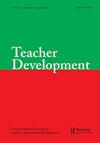幼儿教育工作者积极情绪的重要性
IF 1.1
Q3 EDUCATION & EDUCATIONAL RESEARCH
引用次数: 0
摘要
考虑到教育过程有其认知和非认知的决定因素,本文强调了幼儿教育者的情绪在他们与儿童的工作中的重要性,并着重分析了他们的积极性。共有152名职前和在职幼儿教育工作者参与了本研究。参与者在13天内每天使用积极和消极情感量表进行自我评估。结果显示,参与者最常感到感兴趣、积极、坚定和清醒。他们感到羞耻和敌意的频率最低。因此,他们体验到的积极情绪比消极情绪要多,积极情绪比消极情绪要高。职前教育工作者比在职教育工作者更频繁地经历负性情绪,且正性比率较低。本文强调了在学前教育和在职幼儿教育工作者的初始教育和专业发展过程中,为他们的情感状态提供支持的重要性。本文章由计算机程序翻译,如有差异,请以英文原文为准。
The importance of positive emotions among early childhood educators
ABSTRACT Bearing in mind the educational process has its cognitive and non-cognitive determinants, this article emphasizes the significance of early childhood educators’ emotions in their work with children and focuses on the analysis of their positivity. A total of 152 pre-service and in-service early childhood educators participated in this study. The participants self-evaluated using the Positive and Negative Affective Schedule scale daily for 13 days. The results showed that participants most frequently felt interested, active, determined, and awake. They felt ashamed and hostile the least frequently. Therefore, they experienced more positive emotions than negative ones with a relatively high positivity ratio. The pre-service educators experienced negative emotions more frequently and had a lower positivity ratio than in-service educators. This article emphasizes the importance of providing support to pre- and in-service early childhood educators in the domain of their affective states during their initial education and professional development.
求助全文
通过发布文献求助,成功后即可免费获取论文全文。
去求助
来源期刊

Teacher Development
EDUCATION & EDUCATIONAL RESEARCH-
CiteScore
2.10
自引率
8.30%
发文量
33
期刊介绍:
Teacher Development is a fully refereed international journal publishing articles on all aspects of teachers" professional development. It acts as a forum for critical and reflective attention to practice in teacher development and aims thereby to contribute to the quality of professional development. The journal takes a "whole-career" view of teacher development, and work from both international and inter-professional perspectives is welcome. Articles may deal with teacher development in varying political and professional contexts, and may be in a variety of styles, in keeping with the diversity of activity in professional development.
 求助内容:
求助内容: 应助结果提醒方式:
应助结果提醒方式:


